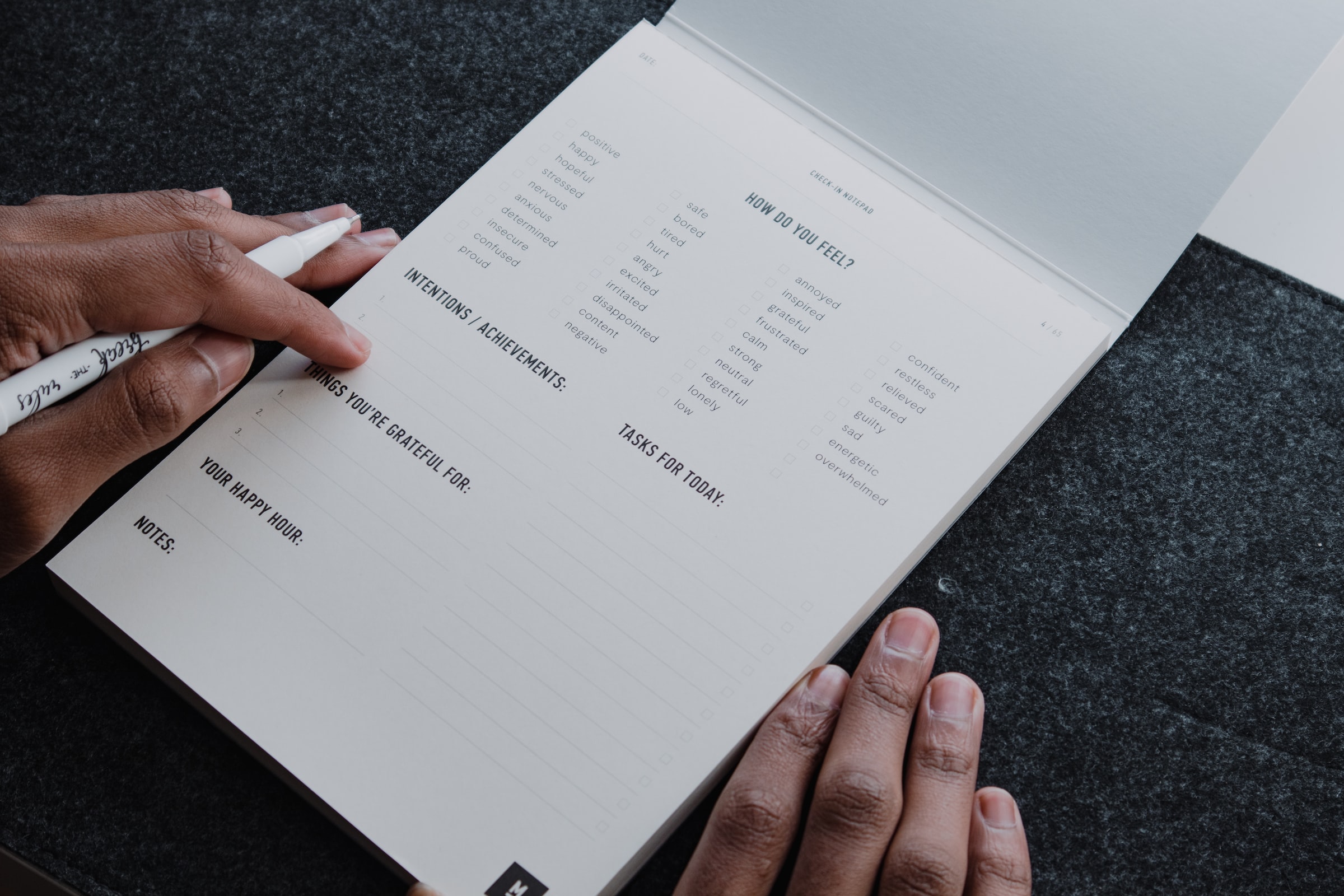Do you ever find yourself daydreaming about the life you truly want to lead but struggle to make it a reality? Well, I’m here to tell you that the biggest thing standing between you and the life you want is building healthy habits.
Forming good habits is essential for working towards the life you envision for yourself. Staying within your comfort zone and doing the same things you’ve always done might not help you achieve your desired outcomes . By implementing good habits into your life, you can begin stepping outside your comfort zone and start building the life of your dreams.
In this blog post, I will review 5 habits that could help you create your version of a dream life. These habits include: Setting Daily Goals, Weekly Networking, Reflecting On Your Failures, Daily Reading, and Daily Skill Building.
Habit 1: Set Daily Goals

Most everyone has some goal they want to achieve. But how many people actually achieve them? According to this study performed by Psychologist Dr. Gale Matthews, those who write their goals down are 42% more likely to achieve them! This result doesn’t surprise me as I’ve witnessed many of my students at ENTRE Institute achieve results by writing down their goals.
Setting daily goals involves writing down at least one specific goal you want to achieve each day, big or small. For example, you might set a daily goal of exercising for at least 30 minutes. As you work on that goal, you might gain the confidence to add another goal to your list. Eventually, these goals may turn into habits that become part of your daily routine.
I challenge you to set one daily goal for yourself and add more as you go. Although you might not see any changes immediately, you may eventually witness the fruits of your labor over time.
How I Set Daily Goals For Myself
As for myself, I’m a huge proponent of writing down your visions, goals, thoughts, etc., because I believe that visualization is one of the keys to success. Seeing your goals and visions in front of you instead of just thinking about them can help motivate you to work for them.
Specifically, setting daily goals has helped me tremendously in my life. It’s easy to think or say you want to do something, but actually writing it down can help set things in motion. One way that I incorporate this habit is by weaving it into my daily schedule.
For example, some daily goals I’ve added to my schedule are working out, prioritizing deep work, spending time with my family, and practicing gratitude. Being intentional in setting these daily goals from the beginning allowed me to work toward my goals without overwhelming myself.
Benefits Of Setting Daily Goals
Building Healthy Habits
Setting daily goals can lead to building healthy habits by helping you work towards something each day. Over time, working on your daily goals can become habits you perform without thinking.
Developing Discipline
Setting goals can help you develop discipline by being intentional with your daily actions. Although you may not feel like working on a daily goal, you can build the discipline to work on it.
Creating Routines
Daily goals can quickly become part of your daily routine if you stick with them. Setting intentional daily goals can help you build a daily routine optimized for working toward your larger goals.
Reduce Procrastination
Setting and writing down your daily goals and seeing them throughout the day can help reduce procrastination because you feel obligated to work on them.
Small Goals Can Build Momentum For Achieving Larger Goals
Large goals can tend to feel overwhelming. However, setting small achievable goals can help you feel less overwhelmed, allowing you to chip away at your larger goals!
Increase Feelings Of Accomplishment
Setting daily goals gives you something to work towards each day. As a result, you may feel more accomplished because you intentionally set a goal and worked on it.
Habit 2: Network With At Least One Person A Week

The term ‘networking’ can be a cringey topic for some people. However, networking can be a great tool for increasing your potential resources and opportunities. A simple habit you can build to help you expand your network is to connect with at least one person per week. This person doesn’t have to be someone within your industry. You could connect with your local barista, a stranger at the grocery store, or someone on LinkedIn.
The purpose of this habit is to help increase your confidence in building relationships and expand your network. You never know how one connection could change your entire life.
Benefits Of Networking With At Least One Person A Week
Build Relationships
Building relationships is key to increasing your chances of success, no matter your profession. Networking isn’t just about getting a business card and moving on. Building relationships with others in your industry or field can help you develop genuine connections that may lead to future collaborations, partnerships, or even mentorship opportunities.
Enhance Your Knowledge
You can learn a lot from other people. Talking to others in your industry can help you learn from their successes, failures, and best practices. As a result, you may improve your own skills and strategies.
Increase Your Visibility
Meeting new people and building your network each week can help increase your exposure within your industry or field. As a result, you may gain access to new opportunities such as speaking engagements, job offers, or invitations to join professional organizations or committees.
Tips For Effective Networking
Like any habit or skill, networking requires practice and discipline to improve it. Here are some of my best tips for improving your networking skills:
Leverage Your Existing Network
You don’t have to only reach out to strangers to expand your network. You can leverage your existing network by asking people you know if they could introduce you to someone you want to connect with.
Find Common Ground
Striking a conversation with a random stranger can be intimidating. Instead of engaging in potentially painful small talk, try to find common ground. For example, if you notice the other person likes or has posted content about a topic you’re familiar with, start a conversation about that topic. As a result, the other person can see that you’ve taken the time to learn about them, which may result in a deeper connection.
Habit 3: Take Time To Reflect And Learn From Failures

I’ve had my fair share of failures throughout my life, each of which has taught me critical lessons. Taking time each day to reflect and learn from your failures is a great habit to implement into your life. The practice of reflection can help you identify what went wrong in a certain situation. As a result, you can use the lessons you learned to teach yourself what to do differently next time.
Benefits Of Reflecting And Learning From Failures
Personal Growth
When you take a step back and analyze what went wrong, you gain a deeper understanding of yourself and your decision-making process. This can help you develop new skills and behaviors that could prevent you from repeating the same mistakes in the future.
Can Improve Your Decision-Making Skills
By gaining a deeper understanding of what works and what doesn’t, you can build tools to make better choices in the future. As a result, you can equip yourself with the knowledge and experience to easily navigate challenging situations.
Can Increase Resiliency
By adopting a growth mindset, you’ll learn to see failure as an opportunity to learn and improve. This may give you the determination and perseverance to overcome obstacles and achieve your goals.
Strategies For Incorporating Reflection And Learning Into Your Daily Routine
Plan It Out
Planning out time to reflect and learn from your failures can help you make it into a daily habit. Making a plan can also help you prioritize this time rather than push it aside.
Write It Down
Reflection is important, but writing down your thoughts and what you’ve learned is equally important. Writing these things down can help guide future decisions and measure your progress throughout your journey.
Habit 4: Read For At Least 30 Minutes A Day

Reading is one of the most beneficial pastimes you can engage in. Many of the most successful people in the world read for hours a day to keep their minds active and learn new things.
However, you may not have hours on end to read. Instead, try to schedule at least 30 minutes a day of reading, preferably on a topic that interests you.
Benefits Of Reading
Mental Stimulation
Reading can enhance mental stimulation by making connections and analyzing information. As a result, your mind is more active and engaged, which can lead to improved cognitive function and memory.
Improve Focus and Concentration
Reading can improve your focus and concentration by helping you to absorb information better and stay engaged in tasks.
Knowledge Acquisition
Reading is a great way to expand your knowledge and learn new things. As you learn new things, you may gain new perspectives or develop new skills that could benefit you.
Stress Reduction
Reading can help you escape your current realities, which may calm your mind and reduce anxiety. As a result, you might improve your mental and emotional well-being. Reading is also a great stress reliever and can potentially help you fall asleep more easily.
Tips For Finding Time To Read And Learn
Incorporate Reading Into Your Daily Schedule
Try to find 30 minutes a day that you can devote to reading. If you don’t have time, try to create time by waking up earlier or removing another activity. Over time, you can build up to reading for longer than 30 minutes if your schedule allows it. If 30 minutes is too long, try 5-10 minutes to start and work your way up. The goal is to build a sustainable habit that won’t burn you out, so do what you can.
Reframe Your Perspective On Reading
Try to view reading as a way to expand your knowledge and stimulate your brain rather than a chore. In addition, reading is a great way to build discipline and improve your cognitive function. Reframing your perspective about reading can make building the habit much more enjoyable.
Read About Topics That Interest You
Choosing a topic you’re interested in is a great way to build a reading habit. The topic can be anything you want, even a fictional fairytale. As you build the habit, you may expand your interests.
Habit 5: Practice A New Skill For At Least 30 Minutes A Day

Practicing a new skill for at least 30 minutes a day is a great way to develop your skill set. Learning a new skill can be anything from playing the guitar to learning a new language or improving your existing skills.
Benefits Of Practicing A New Skill
Personal Growth
Learning new skills can help you grow and develop as a person. It can also boost your confidence and self-esteem and help you to explore new areas of interest.
Increased Creativity
When you learn new skills, you may discover new ways of thinking and problem-solving, which may boost your creativity.
Personal Satisfaction
Learning new skills can give you a sense of personal satisfaction and accomplishment. It can be incredibly rewarding to see yourself progress and achieve new goals.
Tips For Finding Time to Practice A New Skill
Incorporate Daily Skill Building Into Your Routine
Try to find a 30-minute break to practice learning a new skill. If you don’t have 30 minutes, you can try cutting the time down to whatever suits your schedule. You could also wake up earlier or swap another activity for skill building.
Start Small
Learning a new skill can take time. Try to learn the basics first and gradually work your way up. The key to skill building is to take it slow and not rush anything. You want to build a sustainable habit that fits your lifestyle and doesn’t feel like a chore.
Conclusion
Throughout this post, I covered 5 habits that could help you create your dream life: Setting Daily Goals, Weekly Networking, Reflecting On Your Failures, Daily Reading, and Daily Skill Building.
The purpose of building these habits is to encourage you to start working towards your goals and create opportunities for continual growth.. Becoming a better person that attracts success isn’t an overnight occurrence. It requires a lot of hard work and discipline. By slowly building small habits, you can chip away at your goals without overwhelming yourself. Over time, these small habits may lead to a complete lifestyle change without you even realizing it.
I encourage you to try chipping away at one of these habits to build the discipline you need to achieve your version of success.


These are some of the most important skills to not only posses in business but just life in general. Thanks Jeff for caring! 🙂
Thank you for your kind words, Iesha! Agreed – I believe this skills transfer to any area of life, because all areas are important!
Change your habits change your life. Thanks for these practical life changing tips that anyone can do.
Hi Audrey, thanks so much for your kind words! What habits resonated with you most? 🙂
Creation of time is a top goal of mine. I hope to do this through delegation of things that others can do. With time, I can explore my dreams and focus on creating high value. I have found time and money to be two sides to the same coin. If you have time, you will have money. If you have money, you will have time. Thanks, Jeff.
Thank you, Jeff. Yes, it is very important to challenge my mind. Practicing, new skills every day will help me exercise my brain muscle to improve mental sharpness. Reading and writing my goals down every day resonate with me also.